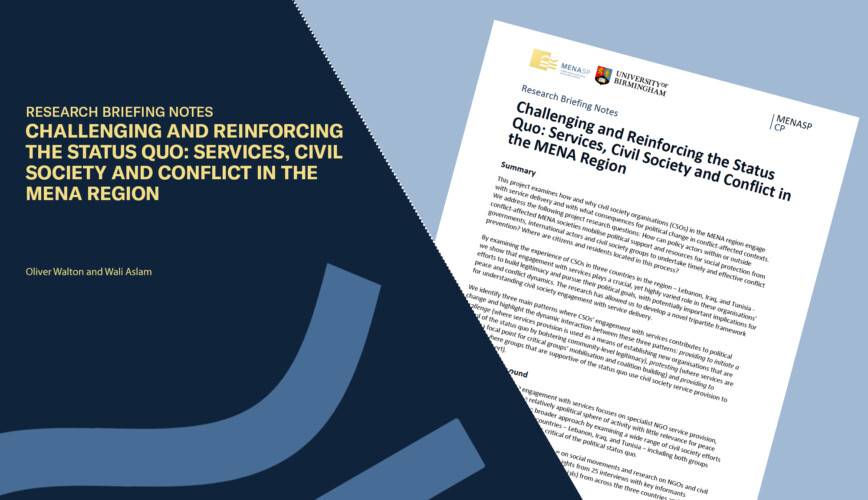This project examines how and why civil society organisations (CSOs) in the MENA region engage with service delivery and with what consequences for political change in conflict-affected contexts.
We address the following project research questions: How can policy actors within or outside conflict-affected MENA societies mobilise political support and resources for social protection from governments, international actors and civil society groups to undertake timely and effective conflict prevention? Where are citizens and residents located in this process?
By examining the experience of CSOs in three countries in the region – Lebanon, Iraq, and Tunisia – we show that engagement with services plays a crucial, yet highly varied role in these organisations’ efforts to build legitimacy and pursue their political goals, with potentially important implications for peace and conflict dynamics. The research has allowed us to develop a novel tripartite framework for understanding civil society engagement with service delivery.
We identify three main patterns where CSOs’ engagement with services contributes to political change and highlight the dynamic interaction between these three patterns: providing to initiate a challenge (where services provision is used as a means of establishing new organisations that are critical of the status quo by bolstering community-level legitimacy), protesting (where services are used as a focal point for critical groups’ mobilisation and coalition building) and providing to reinforce (where groups that are supportive of the status quo use civil society service provision to shore up support).
DOI: 10.48352/uobxmenasp.0004
Authors: Oliver Walton (University of Bath) and Wali Aslam (University of Bath)
This project is supported by the Middle East and North Africa Social Policy Network (MENASP) at the University of Birmingham, in the framework of its ‘strengthening social welfare and security in the MENA region’ research programme, funded by the UK Arts and Humanities Research Council’s Global Challenges Research Fund.
Disclaimer: The opinions expressed in this publication are those of the authors. They do not purport to reflect the opinions or views of the Middle East and North Africa Social Policy (MENASP) Network or the University of Birmingham.
